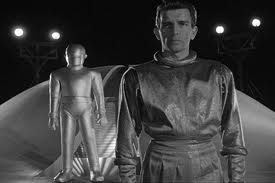 I have always enjoyed games of strategy and tactics. I suppose that’s why I like a good hand of poker.
I have always enjoyed games of strategy and tactics. I suppose that’s why I like a good hand of poker.
Arthur C. Clarke must have enjoyed strategy and tactics as well. Two of his short stories, Hide and Seek and Superiority are both built around S&T.
Hide and Seek (1949) is about using what you have to get the job done. It concerns a spy trying to evade capture in an almost hopeless situation. The lone fugitive is well aware of his enemies superior technology and is able to use this knowledge to his advantage. The enemy is continually frustrated and baffled by the weaker opponent’s tactics until finally giving up and leaving. As in poker, the guy with nothing in his hand is able to win by keeping his cards close to his vest and bluffing his way to victory. Incidentally, there is also a surprising twist at the end that kind of tweaks the nose of stuffed shirts everywhere.
This allegory not only reveals Clarke’s tactical ability, it reflects his preference for the underdog as well. Since this story was written shortly after the second world war, I suppose you can extrapolate the events to that of the British and Axis early in the conflict. Think Battle of Briton.
Superiority (1951) is a lesson in poor planning and execution; you could say it is the antonym of Hide and Seek. To use the poker analogy again, its like a player with a full house throwing in his cards hoping to draw a straight flush.
The narrator is on trial for losing a war he should have won. He explains to the court how every strategy was thwarted by defective technology. It sort of reminds me of some CIO getting his butt reamed by the board of directors for deploying too quickly.
This is a humorous tale reminiscent of William Tenn’s Liberation of Earth. The biggest laugh is at the end.
As I am sure you can tell, I’m an admirer of Clarke’s. Most famous for his Space Odyssey series, which is a truly fantastic work, he also wrote great short stories. Hide and Seek along with Superiority are just two of them.
I know one thing for certain, I wouldn’t have played Texas Holdem with this guy.



